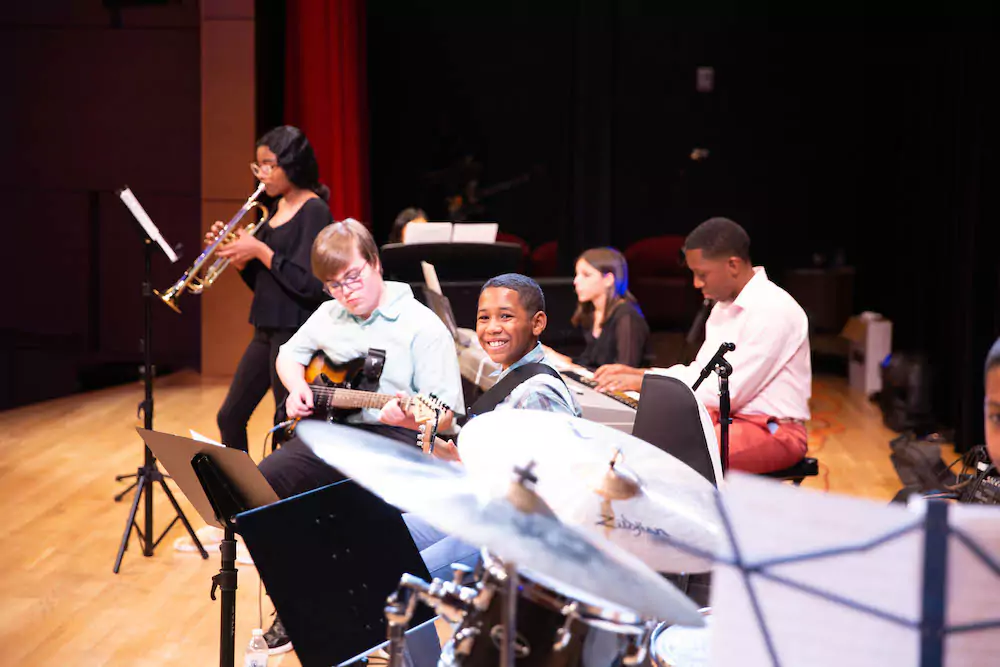Enjoy Music with Others!
PROGRAMS & ACTIVITIES
A musician’s growth and development rely on good instruction, practice, engagement, and seeing others perform. Many musicians who depend solely on music lessons sometimes feel that music is challenging and get discouraged because the excitement and encouragement are missing.
This is why engaging in musical programs and activities is essential to help you improve and develop.
These are some practical ways you can improve
your skills and knowledge:
- Understand Basic Music Theory
- Listen to different types of music
- Interact and perform with other musicians
- Get involved in workshops, ensembles, and rehearsals
- Research and learn from others
- Make time to practice and assimilate what you’re learning
- Attend live performances
What we do
Our goal is all about “Growth and Development.” We listen to and assess our student’s learning needs by designing programs and activities that offer improvement and solutions. Student participation is essential. We involve our students in performances and juries year-round to showcase their talents and evaluate their knowledge and skills.

Workshops
We offer different types of workshops that run 12-15 weeks on a recurring schedule. Workshops may require some musical experience. These are beneficial for students interested in increasing their knowledge and skills. At the end of the course, we will test the student’s knowledge.
TYPES OF WORKSHOPS
- Music Theory
This workshop is designed to cater to students of varying experience levels. It guides them through the fundamental components of rhythm, time signature, key signature, pitch, note recognition, chords, and scales. Understanding all of these elements is crucial as music theory is quite extensive. - Song Writing
Our songwriting workshop focuses on developing the proper techniques for creating great melodies and harmonies. Students learn to listen and write melody motifs by manipulating pitch, phrasing, and rhythm. - Improvisation
Those who have an interest in improvisation will learn how to create a solo using melodic, rhythmic, and harmonic repetitions. They will learn to use the right key for improvising over chord progressions and song structures. - Violin Workshop
In this workshop students develop proper bowing technique and sound. They learn to play great melodic phrases and enhance their performance skills. The Suzuki method is used for students in the beginner and intermediate stages of learning.
Other Types of Workshops
Stay tuned to learn more about upcoming workshops as we continue to grow.
Ensembles
Our ensembles run 12-15 weeks on a recurring schedule to perform by the 15th week from the start date. Students engage with other musicians to learn song repertoire and enhance performance skills. It requires students to have prior experience to pair students on similar levels for the best results.
What are some of the benefits of an ensemble?
- It encourages students to practice
- It gives students a fun experience
- It enables students to develop the proper skill to play with other musicians
- It allows students to play and memorize songs easier
- It gives students exposure on stage with an audience
Types of ensembles:
- Popular Ensemble
- Rock Ensemble
- Christian Music Ensemble
- Jazz Ensemble
Juries
We test our student’s knowledge and performance to ensure they are growing in music. Juries allow us to judge each student’s performance skills. We grade their
- Accuracy
- Technique
- Expression
- Sound
- Confidence
To evaluate their knowledge, students receive a written test to show what they have learned and where they stand. We combine the written test and performance scores to consider the student’s music level.
Here is an example of a beginner level student:
Instrument: Piano
Knowledge Base:
- Recognizes notes A-G (Do-si)
- Recognizes Sharps and Flats
- Identifies pitch on Treble and Bass Clef
- Understands note values and rests (quarter, half, eighth, etc.)
- Recognize time signatures 2/4, 3/4, 4/4
- Can play 5-finger note scales
- The student understands the basic function and structure of the instrument.
Performance:
- Student performs on a steady tempo
- The performance has a clear sound
- Demonstrates good hand and posture technique
- The student can play basic rhythmic and melodic patterns within the performance
